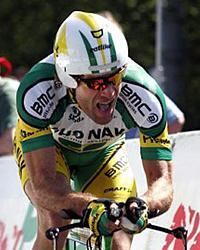
Recently on Cyclingnews.com |
60th Tour de Romandie - PT
Switzerland, April 25-30, 2006
Last chance to sharpen up before Giro
By Anthony Tan in Geneva, Switzerland

|
Finishing up less than a week before the start of the Tour of Italy, this year's Tour de Romandie, as always, is perfectly placed for riders wishing to fine-tune their form before the Giro - or, like Santiago Botero did last year, win one of the most prestigious week-long stage races on the ProTour calendar. Or, for riders like Jan Ullrich, start the season with a shock to the system in an effort to catch up on lost racing time.
Botero rated his comeback win in 2005 more important than any of previous victories; a big call, given stage wins and a mountains jersey at the Tour de France as well as a world time trial championship are listed on his palamrès. Nevertheless, the Colombian had been through a long period of mediocre form, and his victory in Switzerland proved he still has what he takes to win.
2006 marks the 60th edition of the Tour de Romandie, so named because it is held entirely in the country's French-speaking region to the west. 656,3 kilometres, a prologue and five stages including the traditional final time trial in Lausanne is Romandie in a nutshell; but looking closer, this race is much more than a bunch of stages glommed together.
Despite being only 3,4 kilometres long and having little change in elevation, Tuesday's prologue in Geneva is a surprisingly accurate indicator of who will be in contention to win later on in the peace. Australia's Bradley McGee has won here two years ago and believes he can do it again. The next day, the tour moves northeast to Payerne for a 169 kilometre road stage; dotted with just two Cat. 3 climbs, one can expect the race's only bunch sprint - so Robbie McEwen, eat your heart out!
Stage 2 starts and finishes at the race's northernmost point in Porrentruy, also the longest at 171,2 kilometres. With two Category 1 climbs (km 56,2 and km 157,7) along the way and a total 1,810 metres' elevation, Thursday, April 27 is one of the most difficult days in the saddle; maybe one for those often-aggressive Liberty Seguros guys, like Jörg Jaksche or David Etxebarria.
The following day is the only point-to-point stage of this year's Tour de Romandie. Starting in Biel in the far west, it's a relatively flat ride southeast to Leysin until 15 kilometres from the finish, where the day ends atop the 1,318 metre Category 1 climb of Le Sépey. Here, we'll see the first significant reordering on general classification, and for someone like Phonak's Oscar Pereiro or Alberto Contador from Liberty Seguros could take control of the race at this point.
The penultimate stage looks eerily similar in profile to that cruel final day in Ulrichen at last year's Tour de Suisse. which saw Australian Michael Rogers lose to an amazing Aitor Gonzalez, albeit under controversial circumstances. Three Category 1 climbs in just under 130 kilometres for a total 2,360 metres elevation can only be described as a sufferfest - even the gruppetto will need to be moving just to make the time limit!
If the previous day hasn't sorted out the final podium, the Lausanne time trial will. It's arguably one of the most challenging TT parcours in any stage race and a combination of power, suppleness and speed are the requirements; should one fall short in any one of the three, we'll find out 20 kilometres later.
Whatever the objective, the end result for each coureur that finishes the 60th Tour de Romandie will be a considerably fitter rider than the one who started.
